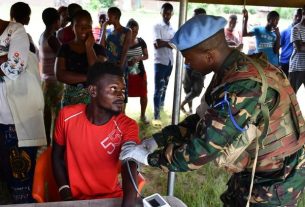|
Getting your Trinity Audio player ready...
|
The term “second generation” is very common in Israeli jargon, referring to the projection of the Holocaust disaster and the trauma experienced by its survivors into the psyche of the next generation. Unfortunately, in trauma-ridden Israel, this did not stop there. The foundational break of the Yom Kippur War created another “second generation,” and there is a heavy concern that the mental health fallout from October 7 will be even deeper and more widespread.
After the Holocaust, while in the process of establishing the country, there was no one to take responsibility and treat the Holocaust victims/survivors. The shame of being exiled, the label of “sheep to the slaughter,” and the Sabra ideal left a large population layer with their broken psyche – often to their nightmares, repression, denial, and madness.
However, the children of these people, of those who had the strength to overcome and those who didn’t, experienced the break, the silence of denial, the anxiety, the suspicion toward the stranger, the feeling of existential threat and daily catastrophe. The environment did not aid in recovery, inscribing a second generation with a genetically transmitted horror.
Even in the Yom Kippur War, the term “combat shock,” already quite familiar, was treated at the periphery of psychological support. “Combat shock” also contradicted the Israeli masculine ethos of brave and indomitable warriors. It took many years before the environment began to recognize post-trauma as a result of their participation in our history’s harshest war.
It took many years for professionals to understand that in the case of the Yom Kippur War too, a second generation was developing. Not understanding what’s happening to the father: feelings of shame in behavior that’s not always controlled or reality-aligned; distrust and suspicion; aggressiveness. Manifestations that seemingly don’t fit the natural and cultural environment. Gradually, a population group developed in which children replaced the functioning of the injured parent, taking command. A fairly defined syndrome. A clear and defined second generation to the Yom Kippur War.
October 7 massacre: An unprecedented wave of horrific trauma
NO ONE prepared us for the horror of the widespread trauma of October 7, a trauma we had never known before.
The magnitude of the catastrophe was followed by an awareness of the state’s failure to protect its citizens, causing individuals to take national and community responsibility for assisting victims of these atrocities. The victims experienced the state’s failure in the initial stage when state institutions stood stunned and paralyzed in the face of the horrors for many days. Israeli society entered the scene with community mobilization to support and embrace the victims, proving that at least the public had internalized the lessons of the past.
Professional bodies supported by philanthropic funds and the spirit of civil volunteering sought to plug the dam and reached out to the displaced and first-line victims. Analysts Assist, a private organization of about 450 analysts from the main psychoanalytic bodies in Israel, provides responses to anyone not covered by the state in terms of eligibility for psychological treatment. Since October 7, these therapists, myself included, respond within an average of three minutes. We are an organization that has so far operated entirely on a volunteer basis and is now nourished by fundraising worldwide to finance long-term treatments.
WITH ALL due respect to goodwill and emergency treatment, sporadic organizations cannot manage the necessary treatment in the long term and prevent the development of post-trauma. Analysis and a tailored response are required. That should come from state institutions, which operate sluggishly, after years of starving psychological services, leaving a therapeutic vacuum that raises real concern for the public’s mental health.
This time, the trauma circles are wide and widespread, reaching the entire Israeli society in one way or another, deeply soaked into the cells of the body and soul, and will be extracted slowly and only with much assistance.
Starting with the hostages who returned from captivity, we, the professionals, saw in the chilling encounter with them how the survival mechanism, the mechanism of psychic isolation activated in captivity, is very hard “to melt.” Many of the captives, even today at home, struggle to return to feeling – to cry, sense, taste, and smell – and continue to operate in minimal and automatic emotional-physical functioning. It will take a long time to thaw.
They are joined by the circle of victims and evacuees who were left homeless, currently presently a home, a safe place that is the most basic condition for recovery. Entire communities are affected. Communal societies have been displaced to various parts of the country; thus a sense of community support, of belonging, so vital for recovery, was also damaged.
Some of the difficulties are related to the national trauma, the breach of trust in the leadership that we all experienced, and deep psychological mechanisms that may harm the recovery of the most injured public and the circles surrounding it.
One of the main challenges to treatment stems from the extent of the widespread trauma. According to estimates, 50,000 to 70,000 people experienced trauma directly or indirectly in these recent events. However, the state only addresses first-line victims and cannot cope with the real extent of the phenomenon. Leaving tens of thousands without an answer is fertile ground for the development of the second generation of the trauma.
We are facing a catastrophe – tens of thousands will produce hundreds of thousands. In a country of less than eight million people, this is an especially high percentage.
The first signs of regular soldiers seeking urgent help bypassing bureaucracy are just beginning to appear, when reserve soldiers return home collapsed from a tough three-month war, urgently seeking psychological help. And the data on soldier suicides is just starting to be collected.
THE HEATING up of the northern sector, the continuation of the fighting, and the terrible adversities of October 7 teach us that the State of Israel is facing a mental health crisis the like of which we have never known. Only responsibility-taking – both communal and national – can lead us to a safe haven.
While community initiatives are important, the state must take full responsibility for treatment and allocate as many resources as necessary for the physical and mental rehabilitation of its citizens so that the “day after” the war, we don’t discover that Israeli society as a whole is a post-traumatic society. The state must establish clinics that provide long and quality mental health treatment throughout the country and expand the existing ones.
Quick and superficial treatment by people who have not necessarily undergone appropriate training, ignoring thousands who do not receive any response at all, will lead Israeli society to collapse.
The mental health treatment of Israeli society is a national mission of utmost urgency. ■
The writer is a guiding psychoanalyst and a founder of the Analysts Assist project for mental treatment of families of the abducted; bereaved families; families of the missing; and displaced persons. She is a guiding analyst of the Psychoanalytic Society in Israel, and a member of Ruach Adam, a Buddhist psychoanalytic training program.


